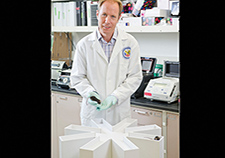Office of Research & Development |
 |
Office of Research & Development |
 |

VA Research Currents archive
July 2, 2014

Dr. Tony Wyss-Coray, with VA in Palo Alto, has found that injecting blood from young mice into older ones can halt the brain's aging process. (Photo by Curt Campbell)
In popular mythology, vampires drink the blood of their victims, leading to a long, albeit evil, life. Now research suggests there may be something to the idea of blood as a fountain of youth, specifically young blood.
The study, published in the journal Nature Medicine in June, showed that blood from young mice could reverse cognitive aging in older mice. The work was done by researchers with the VA Palo Alto Health Care System, Stanford University, and the University of California, San Francisco.
"We know age is a major factor of Alzheimer's disease," says Dr. Tony Wyss-Coray, a health science researcher at VA Palo Alto and a professor in the department of neurology and neurological sciences at Stanford University School of Medicine. "At some point, older people find they are at an increased risk for these illnesses and the older you get, the higher the risk. Right now we can detect damage but there just aren't any treatment options. This could change that."
The study, and two similar ones published by researchers at Harvard, follow up on centuries of speculation about the effect young blood can have on the elderly.
Dr. Clive McCay of Cornell University tested the theory in the 1950s by sewing pairs of mice together, one old, the other young, in a process called parabiosis. The mice would then share blood. McCay found the old mice looked younger and had healthier cartilage than they otherwise would have. Meanwhile, the younger mice began suffering the effects of premature aging.
The surgical technique was dusted off and tried again in the early 2000s by VA-Stanford researcher Dr. Thomas Rando, who would later coauthor a 2011 study with Wyss-Coray that reinforced the theory that there really is something age-specific in the blood. At that stage, the researchers also investigated an alternative to the surgery: transferring blood through injections. In the 2011 study, young mice injected with old blood displayed advanced cognitive decline.
In the most recent study, Wyss-Coray injected older mice, around 60 years old in human years, with plasma drawn from younger mice, closer to 20 years old by our count. The results were staggering. The most noticeable effect was on the part of the brain called the hippocampus. Wyss-Coray explains why it's an important indicator:
"The famous case involves London cab drivers. They have to memorize the streets of the entire city in their head and as a result, brain scans showed they have enlarged hippocampi. The hippocampus is sort of like a relay station that takes information, processes it, and then sends it out. It's particularly important in memory and it's also one of the first to show degenerative change with Alzheimer's and dementia patients. In effect, as you age, it shrinks."
Except in mice exposed to young blood. In the mice that were given injections of young plasma over several weeks, the hippocampus stopped shrinking. Scores on memory and learning tests, such as remembering their way through mazes, improved by roughly 50 percent.
"This isn't about extending lifespan, but having a better quality of life," says Wyss-Coray. "Healthy aging is the key word here."
"People get plasma in hospitals every day all over the world," says Wyss-Coray. "It's not a complicated process."
To that end, Wyss-Coray recently founded a company, called Alkahest, and in a few months, he plans to initiate a clinical trial with early-stage Alzheimer's patients. "We want see if there is a beneficial effect in their memory and daily living. We'll be able to do imaging studies of the brain to see what exactly is happening so we can isolate whatever factors in the plasma are causing these changes to take place."